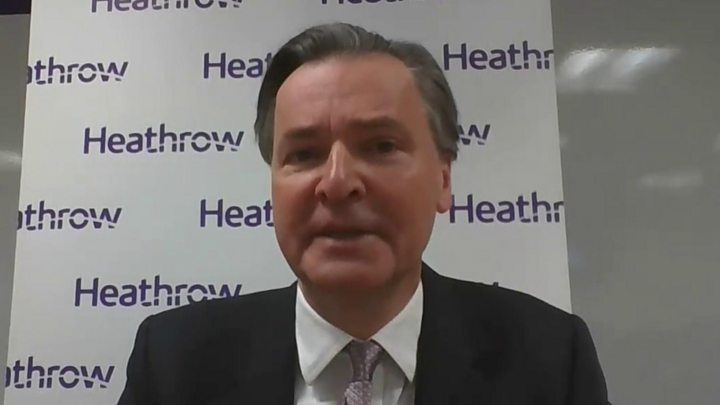Heathrow calls for coronavirus tests at UK airports

Media playback is unsupported on your device
The boss of Heathrow has called for airports to be allowed to test for coronavirus to avoid the «cliff edge» of quarantine.
John Holland-Kaye told the BBC the changes to travel guidance over Spain showed the need for an alternative.
He said he wanted the government to work with it on the plan.
But Culture Secretary Oliver Dowden told the BBC that because the virus could develop over time, testing was not a «silver bullet».
«We are not at the point where there is a viable alternative to the 14-day quarantine,» Mr Dowden said, adding that all options were under review.
Mr Holland-Kaye said the passenger would be expected to pay the cost of each test, which would be about £150 if conducted at the airport.
He acknowledged it is «not cheap», but that the test would come down over time as more people took it.
But he said there would be those prepared to stand the cost: «There are people who are worried about being able to go back to work or get the kids into school, there will be people who are prepared to pay that to avoid the extra period of quarantine.»
The idea of introducing testing at airports is an attractive idea.
The theory being people could travel where they like and just get tested as they arrive back in the country, negating the need to self-isolate.
But the government is not convinced.
Why? Logistically testing all the travellers who arrive every week will be difficult.
Testing capacity has increased, but this would stretch the system. Not to mention the practical difficulties of setting up testing facilities in busy airports.
But the other factor, which is perhaps more crucial, is that in the early stages of infection the test may not even pick it up.
Instead, officials are much more persuaded by a more intelligent, targeted approach to self-isolation.
That would involve asking only those coming from certain regions in a country where the infection rates are highest to self-isolate.
That could then be complemented by then asking them to get tested after a week, meaning if they test negative, there would be no need for the full 14-day self-isolation.
All this and more is being discussed behind the scenes.
Speaking to the BBC’s Today programme, Mr Holland-Kaye said: «The aim would be to have a test on arrival. We could have it up and running in the next two weeks, then we need to work with government to see what happens next.»
He said the plan would be for passengers to go into quarantine and have another test after eight days: «If they were infected we would be confident that it had shown itself. If it was clear, they would be allowed to go out of quarantine earlier than had been the case. It’s very scientifically based.»
Under current rules, those arriving in the UK from certain countries must self-isolate for 14 days.
The government has indicated that it is keeping all quarantine measures under review.
It is said to be considering an eight-day stretch between tests, whereas figures within the travel sector are keen for a five-day period.
The number of days required between each test is critical in reducing the possibility of «false negative» results.
A false negative result is possible if someone who has recently contracted Covid-19 is not showing symptoms.
France is about to launch a compulsory two-test regime for people arriving from 16 at-risk countries, including the United States.
Mr Holland-Kaye said the airport wanted to start up trials with Singapore and Canada.
- FEELING LOST?: How to start thinking about the future
- ‘HOMELESS HOTEL’: Lockdown life inside emergency accommodation

